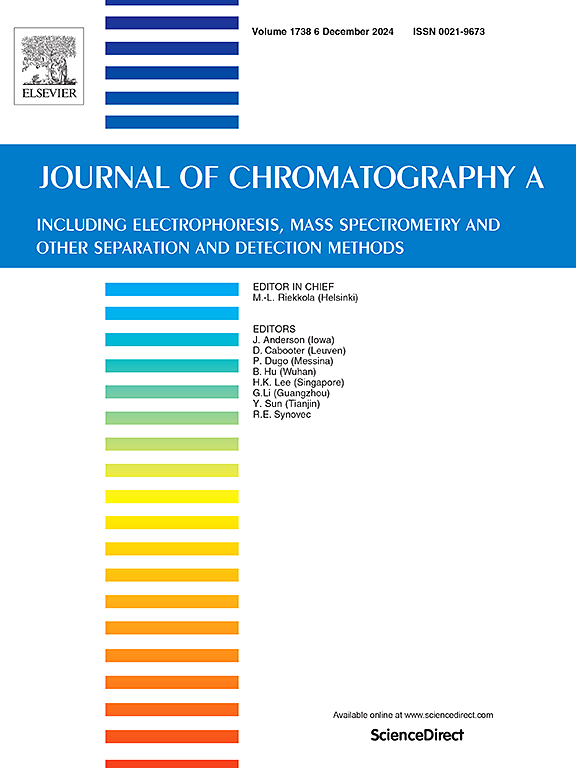Evaluating the detection of barbiturates in dried blood spots: A comparative analysis using gas chromatography-mass spectrometry, gas chromatography-tandem mass spectrometry, and liquid chromatography-tandem mass spectrometry with different extraction methods
IF 3.8
2区 化学
Q1 BIOCHEMICAL RESEARCH METHODS
引用次数: 0
Abstract
Rapid and accurate characterization and quantitation of blood barbiturates and their combination drugs are very important for the clinical treatment of acute barbiturate poisoning. A comparison of dried blood spot (DBS) and traditional liquid-liquid extraction (LLE) in the pre-treatment stage, as well as a comparison of gas chromatography-mass spectrometry (GC–MS), gas chromatography-tandem mass spectrometry (GC–MS/MS), and liquid chromatography-tandem mass spectrometry (LC-MS/MS) as instrumental analysis methods, revealed differences in the analysis results of barbiturates and their combination drugs under different conditions. Based on these findings, we introduce a DBS-GC–MS/MS method. The developed and validated method showed good selectivity, sensitivity (LOD: 0.1 μg mL−1, LOQ: 0.2 μg mL−1), linearity (R2>0.9992), trueness (<15 %, except for carbamazepine, at 29.4 %), and precision (<15 %). Recovery was also good for most target compounds, but significant matrix effects were evident. Compared with the LLE method, the DBS method has the benefits of easy sample collection, storage, and transport, as well as simple pre-treatment and reduced reagent and energy consumption. Compared to LC-MS/MS, GC–MS/MS requires no switching between positive and negative ion modes and uses the MRM detection mode, meaning that more information about the sample compounds can be obtained in less analysis time. Using actual sample analysis, we have demonstrated the advantages of the DBS-GC–MS/MS method for the qualitative and quantitative analysis of barbiturates and poisoning events due to combinations of these drugs. Comparison of the three instruments and the two treatment methods revealed their analysis characteristics. From the perspective of practical application, the broad practical value and advantages of DBS should be embraced in more applications, and future analytical laboratory development should continue to recognize GC–MS/MS as a useful supplement to LC-MS/MS.
评估干血斑中巴比妥酸盐的检测:使用气相色谱-质谱法、气相色谱-串联质谱法和液相色谱-串联质谱法与不同提取方法进行比较分析。
快速准确地定性和定量血液中的巴比妥酸盐及其复方药物对急性巴比妥酸盐中毒的临床治疗非常重要。通过比较前处理阶段的干血斑(DBS)和传统的液液萃取(LLE),以及气相色谱-质谱(GC-MS)、气相色谱-串联质谱(GC-MS/MS)和液相色谱-串联质谱(LC-MS/MS)等仪器分析方法,发现巴比妥类药物及其复方药物在不同条件下的分析结果存在差异。基于这些发现,我们介绍了一种 DBS-GC-MS/MS 方法。所建立和验证的方法具有良好的选择性、灵敏度(LOD:0.1 μg mL-1, LOQ:0.2 μg mL-1)、线性度(R2>0.9992)、确证度(R2>0.9992)和定量限(R2>0.9992)。
本文章由计算机程序翻译,如有差异,请以英文原文为准。
求助全文
约1分钟内获得全文
求助全文
来源期刊

Journal of Chromatography A
化学-分析化学
CiteScore
7.90
自引率
14.60%
发文量
742
审稿时长
45 days
期刊介绍:
The Journal of Chromatography A provides a forum for the publication of original research and critical reviews on all aspects of fundamental and applied separation science. The scope of the journal includes chromatography and related techniques, electromigration techniques (e.g. electrophoresis, electrochromatography), hyphenated and other multi-dimensional techniques, sample preparation, and detection methods such as mass spectrometry. Contributions consist mainly of research papers dealing with the theory of separation methods, instrumental developments and analytical and preparative applications of general interest.
 求助内容:
求助内容: 应助结果提醒方式:
应助结果提醒方式:


